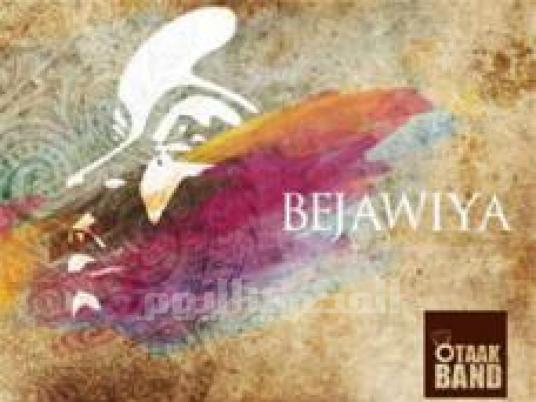
There’s something infuriating about Otaak Band. Their CD release party at the Cairo Jazz Club — which saw six musicians huddled in a corner stage, surrounded by more than twice their number in instruments — resulted in a performance that was both lively and hypnotic, and constantly engaging.
Sudden handclaps and chants, repetitive rhythms escalating in intensity, and mid-performance role-swapping all gave an improvised feel to the show, as did frontman Ahmed Said Abuamna’s decision to treat the audience to some traditional Beja dance moves.
Seen live, Otaak Band radiate an intoxicating energy that simultaneously fogs your brain and tugs at your feet. Unfortunately, somewhere between the Jazz Club and my iPod, that energy completely dissipated. And, no, it’s not the settings on my iPod. It’s just that Otaak Band are one of those few bands that sound better live than they do in the controlled confines of a recording studio.
That’s not to say their debut, "Bejawiya," isn’t a good album. It’s just not what it could have been, or even what it claims to be. For an album that promises to fuse tribal Sudanese music with elements of the blues, "Bejawiya" is a lot softer than either of its supposed influences would suggest. The ruggedness of desert life, the yearning and melancholy that form the backbone of the blues genre — none of these are even remotely sensed in Otaak Band’s debut which, while pretty, suffers from mostly sounding like one of those world music compilations you can pick up at a Starbucks cafe — bland, and about as ‘exotic’ as a shiny package of imported coffee.
The story behind the band, at least according to the CD booklet, is as follows: While visiting Egypt, American musician Miguel Merino was introduced to the massankop, an ancient African lyre similar to the modern Egyptian semsemiya, which “has been the instrument of the Beja peoples since time immemorial.”
The same Sudanese musicians who introduced Merino to the massankopalso introduced him to Ahmed Said Abuamna, a prominent singer from the Hadandawa, the largest of the Beja clans, who collectively live along the Red Sea coast, from southeastern Egypt to Eritrea. Merino and Abuamna soon began working on the album, with Abuamna providing lyrics to Merino’s Beja-inspired compositions. A little under three years later, their album comes to life.
The main problem with "Bejawiya" isn’t that it’s overproduced as much as it is overworked. While the album’s slick sound may be somewhat at odds with the earthiness it seeks to depict, the real flaw is how cluttered the tracks feel, as if the musicians involved were obligated to meet a quota of instruments. It’s hard to tell exactly how many members make up Otaak Band. There are 11 musicians listed in the album’s liner notes, but only two of them — Abuamna and Merino — appear in the booklet’s photos.
Whether or not this is meant to indicate that whoever makes up the core of the band is irrelevant; for most of its running time, "Bejawiya" sounds as if it could have been performed by an entire tribe. The rambunctious approach worked well at the Jazz Club, but it’s glossed over on the actual album, removing whatever edge — and, to a large extent, spirit — the compositions might have held.
Heard live, "Ogna" is an urgent call, its latter half setting Abuamna’s lovelorn pleas against what sounds like a raging firestorm of despair. On the album, that fire might as well be a single candle, filmed in soft focus. The result is a CD that — despite Merino’s cymbal-smashing percussion, a scattering of zaghroutas and a wide ensemble of instruments — still sounds frustratingly flat.
Which is as much a shame as it is a mystery, considering the album’s only stars are Abuamna’s rousing vocals, wisely brought to the forefront in the production, even if at times at the expense of all other components, and the band’s instrument of choice, the massankop.
Consequently, "Bejawiya" is at its best when it keeps things simple. The traditional pieces, like "Tehabay 1," "Bebop" and particularly "Terbal," offer enticing examples of how entrancing a stripped-down version of this album could be. Well-judged embellishments, such as the saxophone breezing through "Kwaal/W’afirhasa" or the ominous bass line backing up "W’annaafi," help bring out some texture, as do the instruments that eventually fill out "Ogbil," another definite highlight that features the album’s strongest writing and a truly remarkable performance by Abuamna.
The more intricate tracks, however, just don’t work. There are some nice flourishes, such as the abrupt bursts of handclaps and chanting, and the drum roll that interrupts "Daleeb," but the disjointed drum solo that leads out that same track feels forced and unfocused, and lays waste to an otherwise compelling composition.
Meanwhile, "Three Years," despite featuring one of Abuamna’s more stirring performances, is just plain awful. The lyrics are fine, but the music sounds like what you’d get if you mixed a deodorant commercial with a 1980s breakup montage. But those are all minor flaws considering "Ifaarsa" includes a spoken word verse — which, even in the hands of the most accomplished musicians, barely ever works, especially if, as in this case, it includes phrases like “those who cherish their tribe more than their souls are not afraid of death when the battle happens,” delivered in a clear American accent.
Otaak Band claim to be a fusion of sounds, but they’re definitely more Beja than blues, and based on the evidence presented in "Bejawiya," should probably stay that way. And until they figure out whether they want to amp it up or tone it down in the studio, you’d be better off catching a live performance than listening to "Bejawiya."




